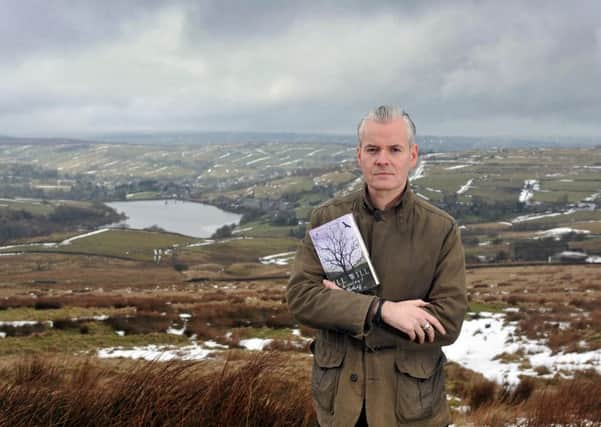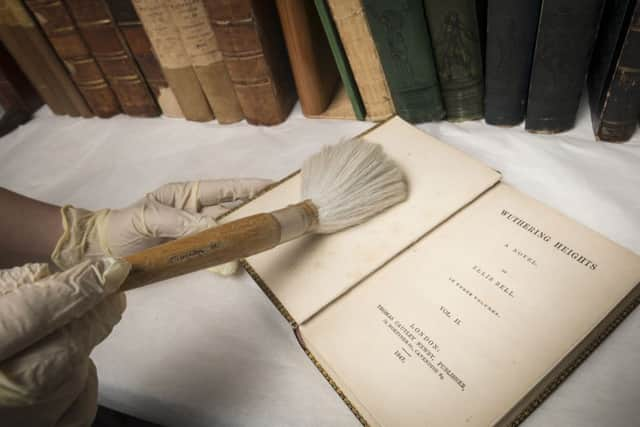Michael Stewart on why his new book solves the mystery of Wuthering Heights


It is one of the great literary mysteries involving one of English literature’s most complex and intriguing characters. In chapter nine of Emily Brontë’s extraordinary novel Wuthering Heights, Heathcliff runs away one night in the middle of a storm after overhearing Cathy tell Nelly Dean that she would be ashamed to marry him.
He is absent for three years and when he returns he is changed. He has money, is educated and has the upright bearing of someone with new-found self-confidence. There’s also a streak of cruelty in him that was not present before.
Advertisement
Hide AdAdvertisement
Hide AdSo, what exactly did Heathcliff get up to during that three-year absence? It is a question that Bradford-based author Michael Stewart has been pondering for some time and he provides a beautifully written, thrilling answer in his new novel Ill Will, published later this month. Publication was timed to coincide with the bicentenary this year of Emily Brontë’s birth, but it is a measure of the interest in Heathcliff’s story that the film rights have already been snapped up by Kudos, the production company behind a number of top-quality television dramas including Broadchurch, Gunpowder and Apple Tree Yard.


Stewart’s own fascination with Wuthering Heights goes back a long way. It began as a child when he first heard Kate Bush’s hit song which was at the top of the UK charts for several weeks in 1978. Stewart, who was just seven years old at the time, was captivated. “There was something about the lyrics, I had no idea it was based on a book, and I became obsessed by it,” he says. “I taped it from the radio on my little cassette recorder and just listened to it over and over.”
His mother, who by coincidence was studying Wuthering Heights as part of a course at night school at the time, explained the story to him but told him to wait a while to read it because he was still too young. He eventually read it for himself and loved it. Then much later, in 1995, he came across an essay by the academic and author John Sutherland entitled ‘Is Heathcliff a Murderer?’ which speculates on that intriguing period of exile.
“In the opening lines he writes ‘when Heathcliff returns to Wuthering Heights… he has become someone very cruel. He left an uncouth but essentially humane stable-lad. He returns a gentleman psychopath,’” says Stewart. “That phrase ‘gentleman psychopath’ just lodged in my brain. I kept thinking about Heathcliff and who he was – there have been various theories about his ethnicity and origins.”
Advertisement
Hide AdAdvertisement
Hide AdStewart, who has written two acclaimed novels, King Crow and Café Assassin, as well a collection of short stories, Mr Jolly, and an anthology of poetry, Couples, mulled over the early events of Brontë’s original novel. Nelly Dean recounts how Mr Earnshaw walks to Liverpool – on some unspecified business – and returns with presents for his children Cathy and Hindley, as well as a small dark-haired boy who he found at the docks. The boy is taken in by the family and named Heathcliff, the name of the Earnshaws’ first-born son who died in infancy. For Stewart, all this provided plenty of food for thought.


“I wondered why Mr Earnshaw had gone to Liverpool,” he says. “Why would he, a farmer, go to a place where there was no farmers’ market? And why would he go in the summer which is the busiest time of year for a farmer? And why on foot? There was a carriage from Keighley to Liverpool and he himself had at least two horses. Was he going there incognito? I also thought about the fact that Liverpool at that point in history was the biggest slave port in Europe, so maybe he was going there to find a slave? And if he was: why? Did he need someone to help work on the farm? Then there is the fact that Mrs Earnshaw is very hostile towards Heathcliff and that fits in with the back story I have for him.”
Without giving too much away, Stewart’s novel brilliantly incorporates ‘the facts’ of Brontë’s original, expertly filling in the gaps in a way which makes perfect sense. Stewart also forcefully foreshadows the unremitting brutality that we see from Heathcliff when he returns. “When he comes back he has a very routine attitude towards violence – he rapes Isabella, I think he probably killed Hindley, he hangs Isabella’s pet dog and he does all that without any regret or remorse. How has he got to that level of psychopathy?”
When Wuthering Heights first appeared it, people were shocked by it. It was reviled by many reviewers at the time who talked about its savagery and violence. One memorably described it as ‘a compound of vulgar depravity and unnatural horrors’.
Advertisement
Hide AdAdvertisement
Hide Ad“I wanted to restore the coarseness of the original book,” says Stewart. “What shocked the Victorian reader wouldn’t necessarily shock the contemporary reader, so it was about finding the equivalent for the modern reader.”
In Ill Will, Heathcliff takes on the name of William Lee and teams up with a young orphaned girl, named, in a neat tribute to Brontë, Emily. Together they find a clever way to earn a living which involves extracting money from the recently bereaved in Liverpool and Manchester.
It works for a while, but they eventually land in trouble – and at one point there is even a ‘Wanted’ poster issued for them. It means that Heathcliff has to take some drastic action, and blood is spilled. The jeopardy – with the posse on their tail – is reminiscent of the kind you find in Western movies, so it is no surprise to learn that Stewart is a fan of the genre. “Yes, I love all those old Westerns,” he laughs. “They used to show a lot of them on television when I was a kid and I was very struck by them. I really loved that kind of ‘man with no name’ protagonist – and Heathcliff is made in the same kind of cynical mould.”
Aside from doing a lot of reading as research for his novel, Stewart also did a fair bit of walking. “I walked to Liverpool,” he says. “It took me three days to get there – Earnshaw went there and back in three days – and I had a Dictaphone with me so I wrote as I walked. I also did a lot of walking up on the Moors and again I wrote as I walked.”
Advertisement
Hide AdAdvertisement
Hide AdHe spent time looking through the Liverpool slave trade archive, reading diaries and letters and he immersed himself in books on the social history of the era, particularly the industrialisation of the North which would have been in its initial stages at the time the book is set in the early 1780s. “What’s interesting is that Wuthering Heights keeps most of the action inside, so you don’t really see how a rural culture was becoming an industrial culture. I wanted to include that so you get to see a bit of the social upheaval of the time – it was really the beginnings of the working class movement.”
He paints a fascinating picture of the changes taking place and the impact they were having on ordinary people.
It lends the novel an extra layer of satisfying historical authenticity, but ultimately what stays with the reader is the utterly compelling depiction of its central character.
“My book is about answering the questions that surround Heathcliff – you get an explanation. He is no longer a mystery character, he is a character with psychology,” says Stewart. “So, I suppose I feel differently about him now in that I feel like I know what makes him tick, but my feelings about Wuthering Heights remain the same – it has always been one of my favourite novels of all time and it will continue to be. I get something out of it every time I read it.”
■ Ill Will by Michael Stewart is published by HarperCollins on March 22. Today, Michael Stewart will be talking about the book at the Brontë Parsonage Museum. www.bronte.org